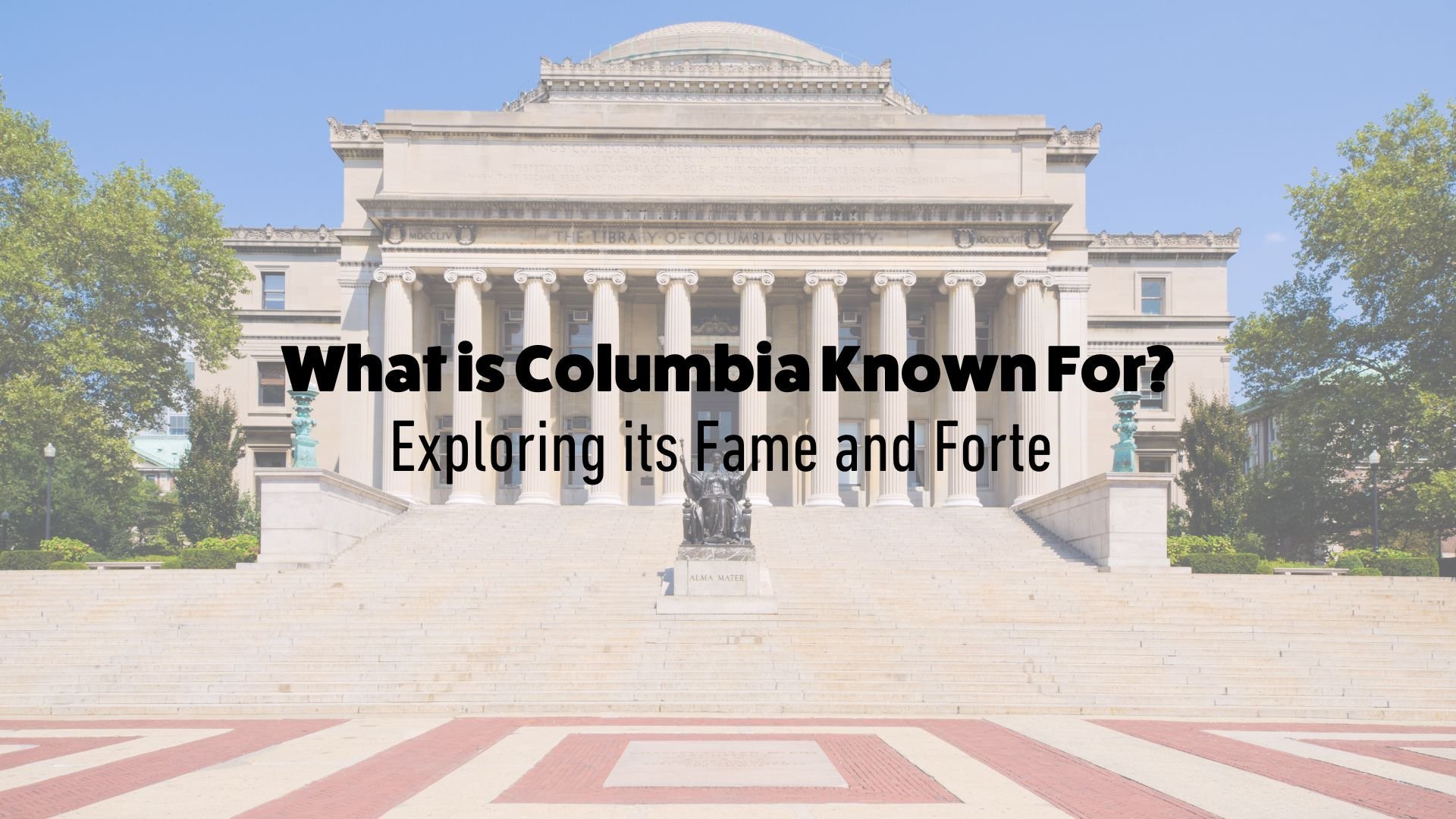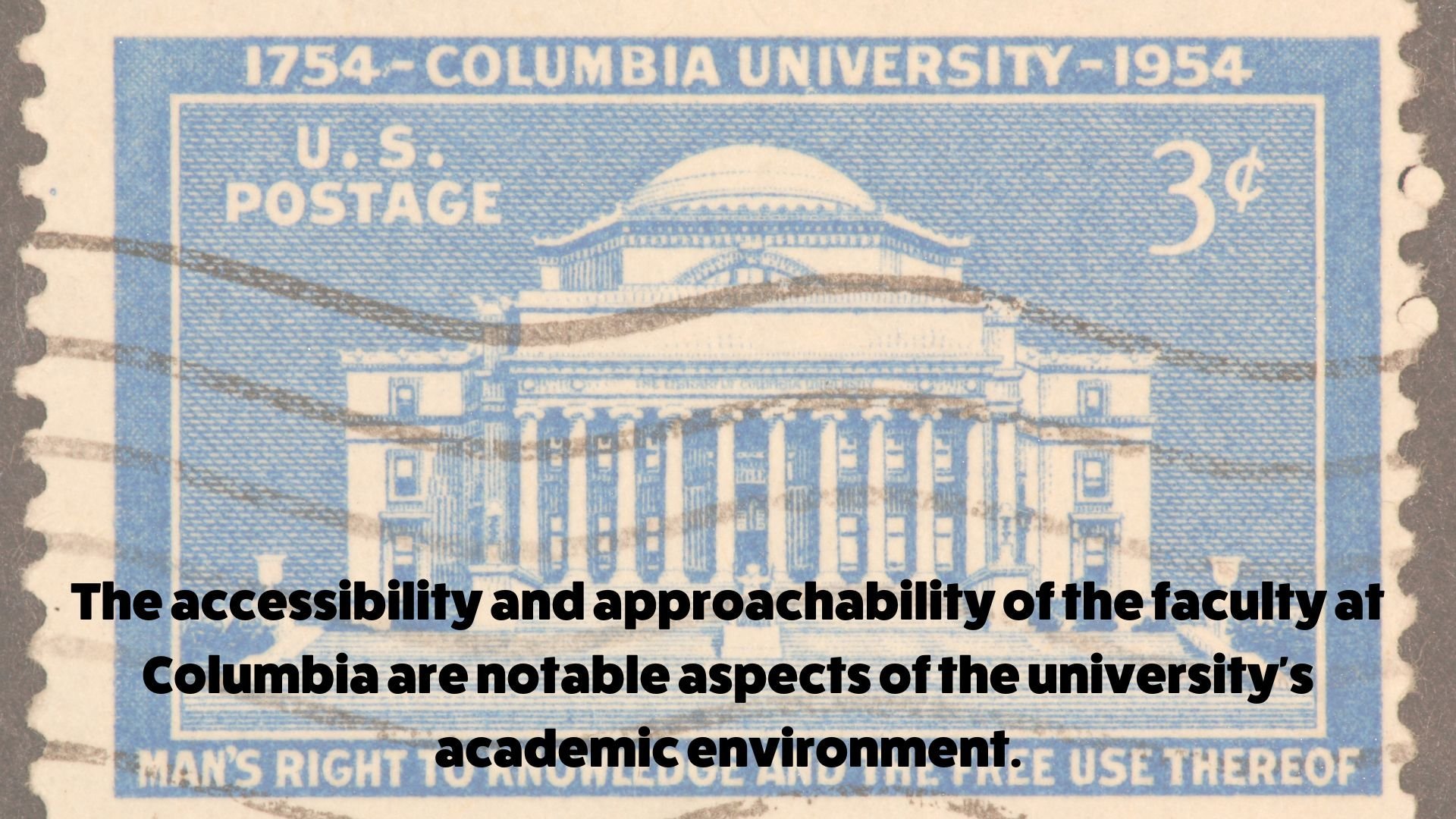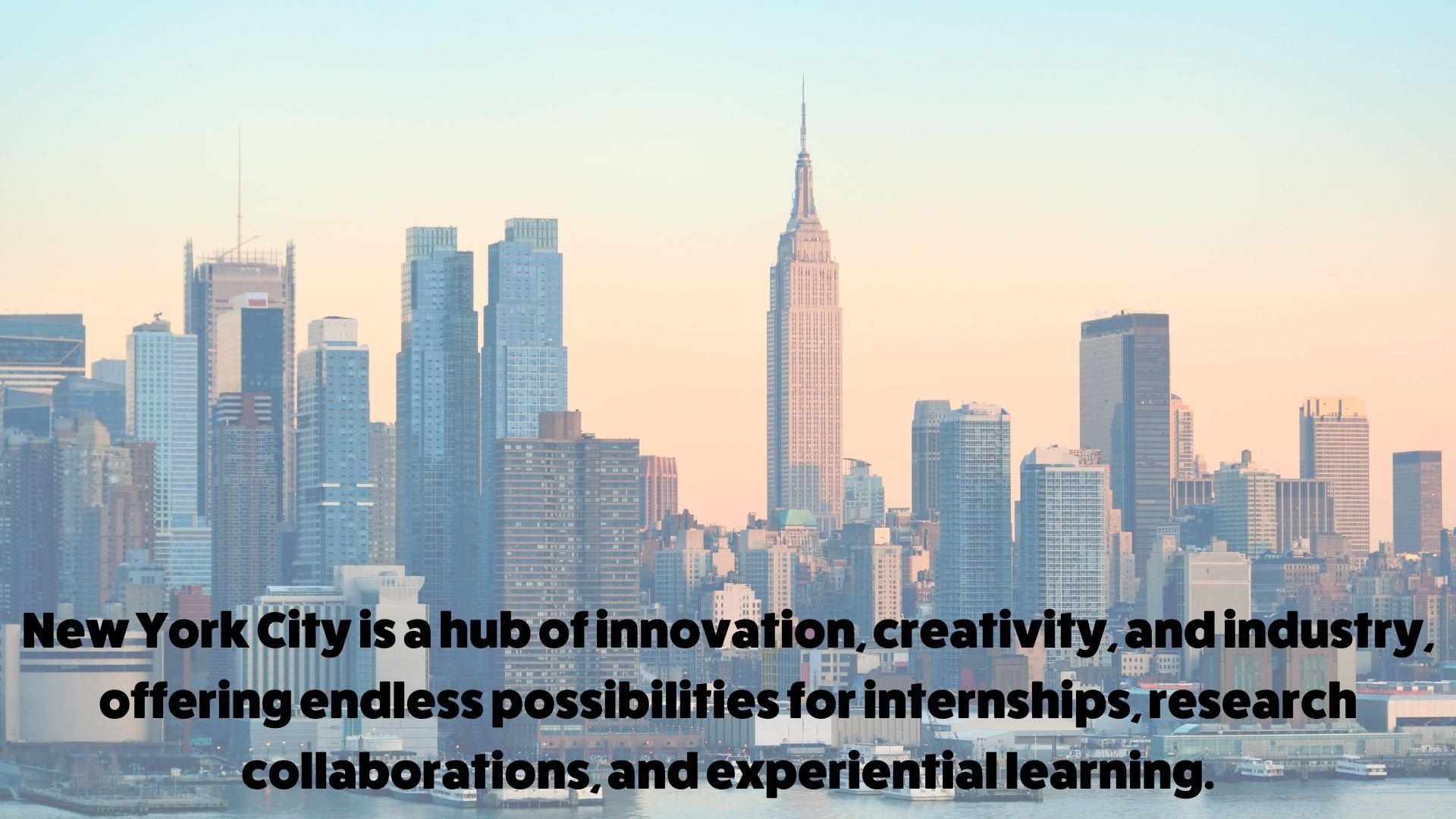What is Columbia Known For? Exploring Its Fame and Forte
Columbia University, located in the bustling metropolis of New York City, stands as an emblem of academic excellence and innovation. With a remarkable history spanning over 260 years, Columbia has cemented its place among the world's leading educational institutions. Renowned for its rigorous programs, distinguished faculty, and commitment to pushing the boundaries of knowledge, Columbia University has earned a stellar reputation that extends far beyond its campus.
Interested in showcasing your intellectual vitality and initiative during high school? Find out how YOU can apply artificial intelligence to the subjects that interest you in InspiritAI’s AI Scholars Program. Students in the Inspirit AI Scholars program craft interdisciplinary AI projects engaging subjects of personal interest to them. Additionally, many students who have participated in the AI+X Individual Research Mentorship have gone on to win prestigious awards at various science fair competitions!
In this blog post, we embark on a journey to explore what Columbia University is truly known for and unravel the multifaceted aspects that make it a beacon of intellectual pursuit. From its outstanding academic programs and renowned faculty to its groundbreaking research and commitment to cultural diversity, we delve into the unique qualities that have positioned Columbia as a global hub of learning. Join us as we uncover the fascinating story behind this esteemed institution and the profound impact it continues to make on the world of education and beyond.
What is Columbia known for?
1. ACADEMIC PRESTIGE
Columbia University has earned an unparalleled reputation for its academic prestige and intellectual rigor. Consistently ranked among the top universities worldwide, it stands as a symbol of educational excellence. The university offers a diverse array of undergraduate and graduate programs across various disciplines, catering to a broad spectrum of academic interests.
Columbia's core curriculum, known as the Columbia College or Columbia Engineering Core, is highly regarded for its interdisciplinary approach. Designed to provide students with a well-rounded education, it encourages critical thinking, analytical skills, and a deep understanding of the humanities, social sciences, and natural sciences. This comprehensive foundation equips students with the tools to navigate complex global challenges and adapt to an ever-evolving world.
Moreover, Columbia University's renowned faculty is a driving force behind its academic prestige. The university boasts a faculty composed of distinguished scholars, researchers, and industry leaders who are at the forefront of their respective fields. These accomplished academics not only excel in their research but also prioritize teaching and mentorship. They foster an environment of intellectual curiosity and inspire students to push the boundaries of knowledge through innovative research and critical inquiry.
Columbia's commitment to academic excellence extends beyond its classrooms and lecture halls. The university's extensive library system houses vast collections of resources, including rare books, manuscripts, and digital archives. Students have access to state-of-the-art laboratories, cutting-edge research facilities, and collaborative spaces that foster innovation and interdisciplinary exploration.
Furthermore, Columbia's location in New York City enhances its academic prestige. The university's proximity to leading industries, research centers, cultural institutions, and entrepreneurial hubs provides unparalleled opportunities for collaboration and engagement. Students can intern at renowned organizations, participate in research projects with industry leaders, and connect with professionals in their chosen fields. This integration of academia with the dynamic urban landscape enriches the educational experience and prepares students for real-world challenges and career success.
2. WORLD-CLASS FACULTY
Columbia University is renowned for its exceptional faculty, composed of world-class scholars, researchers, and industry experts. The university takes pride in attracting and retaining some of the most distinguished minds in academia, who contribute to its intellectual vibrancy and research prowess.
The faculty at Columbia represents a diverse range of disciplines, encompassing fields such as the arts and humanities, sciences, social sciences, engineering, business, law, and more. These accomplished individuals bring a wealth of knowledge and expertise to the classroom, creating a dynamic learning environment that fosters intellectual growth and engagement.
Columbia's faculty members are not only experts in their respective fields but also passionate educators who are dedicated to nurturing the next generation of leaders. They inspire students to explore new ideas, challenge existing paradigms, and think critically. Through their mentorship and guidance, faculty members encourage students to push their intellectual boundaries and pursue their academic and professional aspirations.
The accessibility and approachability of the faculty at Columbia are notable aspects of the university's academic environment. Professors often engage in meaningful interactions with students, both inside and outside the classroom. They provide guidance, support, and mentorship, nurturing a collaborative and supportive atmosphere that encourages intellectual curiosity and academic achievement.
Moreover, Columbia's faculty members are actively involved in groundbreaking research and scholarship, pushing the boundaries of knowledge in their respective disciplines. Their research contributions often have far-reaching impacts, both academically and in addressing real-world challenges. As students engage with faculty-led research projects, they gain valuable insights and experiences that enhance their learning and open doors to further academic and professional opportunities.
Columbia University also benefits from visiting scholars and guest lecturers who bring fresh perspectives and expertise from around the world. The university's commitment to fostering a global intellectual community enriches the educational experience and exposes students to a wide range of cultural and scholarly perspectives.
3. RESEARCH AND INNOVATION
Columbia University has a longstanding tradition of research and innovation, consistently pushing the boundaries of knowledge across a wide spectrum of disciplines. The university's commitment to pioneering research is evident in its numerous research centers, institutes, and collaborations that foster a culture of intellectual curiosity and discovery.
The university's faculty and students engage in groundbreaking research that spans diverse fields, from biomedical sciences to data analytics, sustainable development, artificial intelligence, and beyond. Columbia's research endeavors have led to significant advancements in various domains, making a lasting impact on society and driving innovation forward.
Columbia University's research centers and institutes serve as catalysts for interdisciplinary collaboration. These hubs of innovation bring together experts from different disciplines to address complex global challenges. For instance, the Earth Institute at Columbia focuses on sustainability and environmental research, working towards solutions for climate change, resource management, and sustainable development. The Data Science Institute facilitates cutting-edge research in data analytics and artificial intelligence, promoting advancements in fields such as healthcare, finance, and urban planning.
The university's location in New York City provides unique opportunities for research and collaboration. Columbia researchers have access to a vibrant ecosystem that includes leading industries, cultural institutions, and startups. This proximity to the heart of innovation enables faculty and students to collaborate with experts in their fields and translate their research into practical applications, driving entrepreneurship and economic growth.
Columbia's research efforts also extend to global initiatives and partnerships. The university collaborates with international organizations, governments, and academic institutions worldwide to address pressing global challenges. Through these collaborations, Columbia researchers contribute to groundbreaking discoveries, policy recommendations, and interventions that have a global impact, from healthcare advancements to sustainable development strategies.
Columbia actively supports and encourages student involvement in research. Undergraduate and graduate students have opportunities to engage in hands-on research projects alongside faculty mentors, gaining invaluable experience and contributing to cutting-edge discoveries. The university provides funding, resources, and mentorship programs to empower students in their research pursuits.
4. CULTURAL AND INTELLECTUAL DIVERSITY
Columbia University is celebrated for its commitment to fostering a diverse and inclusive academic community that thrives on the exchange of ideas, perspectives, and experiences. The university attracts a vibrant and globally diverse student body, creating a dynamic and enriching environment for cultural and intellectual exploration.
The cultural diversity at Columbia is evident in the diverse range of backgrounds, ethnicities, and nationalities represented among its students, faculty, and staff. This rich tapestry of diversity contributes to a vibrant and inclusive campus culture, where individuals from different walks of life come together to learn, collaborate, and engage in meaningful conversations.
Columbia actively promotes dialogue and the exchange of ideas through various avenues. Student organizations and clubs cater to a wide range of interests, identities, and cultures, fostering a sense of belonging and providing platforms for students to share their unique perspectives. Cultural festivals, performances, and events showcase the vibrant traditions and customs of different cultures, creating opportunities for cross-cultural understanding and celebration.
Moreover, Columbia University places a strong emphasis on global engagement and international experiences. The university offers numerous study abroad programs, internships, and research opportunities worldwide, enabling students to immerse themselves in different cultures, broaden their horizons, and gain a global perspective. These experiences not only enrich students' academic journeys but also foster cultural sensitivity and global citizenship.
Intellectual diversity is another hallmark of Columbia's academic community. The university values a multitude of perspectives and encourages students to engage with diverse ideas and challenge their own assumptions. Classroom discussions, seminars, and debates provide platforms for intellectual exploration, where students can analyze complex issues from various angles and develop critical thinking skills.
The university's commitment to intellectual diversity is further reflected in its efforts to recruit a diverse faculty that brings a wide range of perspectives and expertise to the table. By fostering a faculty body with diverse backgrounds, Columbia ensures that students are exposed to different approaches to learning and research, contributing to a well-rounded and comprehensive educational experience.
5. NEW YORK CITY AND BEYOND
Columbia University's location in the heart of New York City provides students with a unique and unparalleled educational experience. The university's strong connection to the vibrant cityscape enhances academic pursuits, expands opportunities for professional growth, and exposes students to a multitude of cultural and social experiences.
New York City serves as an extended classroom for Columbia students. The city is a hub of innovation, creativity, and industry, offering endless possibilities for internships, research collaborations, and experiential learning. Columbia students have the advantage of being in close proximity to leading companies, startups, cultural institutions, and research centers, allowing them to gain practical experience and engage in cutting-edge projects that complement their academic studies.
The city's rich cultural landscape provides a wealth of resources and opportunities for intellectual and artistic exploration. Students can visit world-class museums, attend Broadway shows, participate in literary and artistic events, and immerse themselves in the city's vibrant cultural scene. New York City's diverse neighborhoods also offer unique experiences, allowing students to engage with different communities and broaden their understanding of the world.
Beyond New York City, Columbia University maintains a global perspective through its commitment to international engagement. The university offers numerous study abroad programs that span across continents, enabling students to immerse themselves in different cultures, gain a global perspective, and develop a deeper appreciation for diverse societies and global issues. These programs provide invaluable opportunities for cross-cultural learning, language acquisition, and personal growth.
Columbia also collaborates with leading academic institutions and organizations around the world, establishing partnerships that foster research, cultural exchange, and intellectual collaboration. These international connections create a global network that expands opportunities for research, academic exchanges, and joint initiatives, further enriching the educational experience for Columbia students and faculty.
Additionally, Columbia University's alumni network extends far and wide, providing graduates with connections and resources that can propel their careers forward. The university's alumni community includes leaders in various fields, from business and politics to the arts and sciences, offering a vast network of support and mentorship opportunities for current students and recent graduates.
Conclusion
With its rigorous academic programs, distinguished faculty, commitment to research and innovation, celebration of cultural and intellectual diversity, and unique location in the dynamic city of New York, Columbia offers students an unparalleled educational experience.
From its rich history spanning over two centuries to its global impact in research and scholarship, Columbia University continues to shape the future of education and make a significant contribution to society. The university's commitment to pushing the boundaries of knowledge, fostering critical thinking, and preparing students for the challenges of a rapidly changing world sets it apart as a global leader in higher education.
As students embark on their academic journeys at Columbia, they are immersed in a vibrant and inclusive community that encourages intellectual curiosity, cultural exploration, and personal growth. Through engagement with distinguished faculty, groundbreaking research opportunities, exposure to diverse perspectives, and the unparalleled resources of New York City, students are empowered to become well-rounded, innovative thinkers and global citizens.
Columbia University's legacy of academic prestige, research excellence, and cultural and intellectual diversity continues to attract and inspire students from around the world. The transformative educational experience offered by Columbia equips graduates with the knowledge, skills, and global perspective necessary to make a lasting impact in their chosen fields and contribute to the betterment of society.
About Inspirit AI
AI Scholars Live Online is a 10 session (25-hour) program that exposes high school students to fundamental AI concepts and guides them to build a socially impactful project. Taught by our team of graduate students from Stanford, MIT, and more, students receive a personalized learning experience in small groups with a student-teacher ratio of 5:1.



